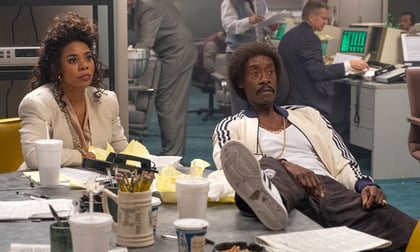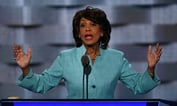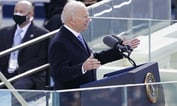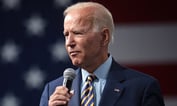Tragedy plus time equals comedy. The veracity of that familiar calculation is what Showtime is banking on with a new comedy series satirizing the horrific market crash of Oct. 19, 1987, when the Dow Jones industrial average suffered the biggest single-day plunge in Wall Street history.
But forget history if you watch the 10-episode “Black Monday,” premiering Sunday at 10 p.m. A funny, fictionalized take on what “really” caused the crash, it focuses on a made-up Wall Street firm of oddball outsider traders in 1986-’87. Don Cheadle (“House of Lies”) plays The Jammer Group’s high-octane owner.
In an interview, the series’ creators David Caspe (“Happy Endings”), 40, and Jordan Cahan, 41, told ThinkAdvisor why they decided to poke fun at the financial services industry.
Seth Rogen (“Knocked Up”) and producing partner Evan Goldberg (“Superbad”) are executive-producing the show and directed its pilot episode.
“This is a funny fever-dream look at the business,” Caspe says. “It shouldn’t be watched for accuracy. We invented rules to help the stories.”
The far-fetched premise: A group of underdog traders take on the white-male old-boys club of Wall Street and crash the financial system.
Cheadle’s character is head of an inclusive Wall Street trading firm packed with folks of diverse races and sexuality. During the 1980s, most would never have been hired as traders, insist Caspe and Cahan, who are Caucasian.
At Jammer, a black woman holds the position of head trader, played by Regina Hall (“Girls’ Trip”). Andrew Rannells (“Girls”) is a young, naïve trader; and Paul Scheer (“The League”) is a trader who’s eager to please.
Though the writers took liberties with history, Caspe first picked the brain of his dad, a former Chicago commodities trader. For one, he learned about the wily practice dubbed “The O’Hare Spread.” Caspe and Cahan turned it into “The LaGuardia Spread” for the New York-set series.
The show is laced with coarse language, and visible cocaine consumption is SOP.
ThinkAdvisor recently talked with Caspe and Cahan, speaking by phone from Los Angeles, where they were deep into editing “Black Monday’s” fifth episode.
Here are excerpts of our conversation:
THINKADVISOR: The real-life Black Monday was a dreadful day on Wall Street, when the Dow plummeted 22%. But you’ve made comedy out of it. What was your aim creatively?
DAVID CASPE: It’s a funny, hyper-color fever dream of Wall Street rather than a documentary. I feel that in some ways, people in financial services would prefer to watch the comedy version, where we just made up everything rather than trying to make it accurate.
JORDAN CAHAN: We’re comedy first. Beyond that, we’re trying to satirize [1980s Wall Street] culture and hold up a bit of a mirror to the world now.
But are there any parallels between the series and history? Actual Black Monday holds the title of the worst single-day market drop ever.
CAHAN: To this day, people are still puzzled and theorizing about what caused that crash. We felt it was a really fun opportunity for comedy and to fill in the blanks of history by creating our own little insane world of how the crash happened. It’s historical fiction.
I’m not asking to reveal anything specific, but what are you saying caused the crash? [Spoiler Alert!]
CASPE: It has something to do with [trader] Blair’s [Rannells] algorithm. There’s been a lot of speculation that trading programs had something to do with [the real Black Monday] — that when one of them triggered sell orders, that triggered a waterfall and then panic and accelerated selling. Our reason [for the crash] is a bit like that but a little more “on purpose.”
 Left to right: David Caspe, Jordan Cahan and Seth Rogen behind the scenes of “Black Monday.” (Photo: Erin Simkin/Showtime)
Left to right: David Caspe, Jordan Cahan and Seth Rogen behind the scenes of “Black Monday.” (Photo: Erin Simkin/Showtime)
What inspired you to create the series?
CASPE: I’ll sound incredibly stupid trying to talk about finance because I don’t know much about it — but my father worked as a soybean trader in Chicago and would always tell me crazy stories about Wall Street and trading in general. The ones from the 1980s were particularly funny but also incredibly heartbreaking. It all seemed ripe for a comedy [about that period] with a lot of jokes about the ridiculousness of the ‘80s, the excesses, and the wild characters you’d find in the world of trading.
What about plot?
CASPE: There was also the crazy high stakes where people could lose everything in a day or a minute and literally jump to their deaths. It was an odd combination of things that are really funny but also kind of terrifying.
What’s one of the stories your dad told you?
CASPE: It was about “The O’Hare Spread”: If a trader was down to his last dime, he’d take a huge position on margin. Then he’d go to O’Hare Airport and from there, call to check on the trade. If it was a winner, he’d come back a hero. If it was a loser and he lost everything, he’d get on a plane and disappear forever, leaving his family behind. That was a real thing my father told me about.









 January 18, 2019 at 03:39 PM
January 18, 2019 at 03:39 PM











